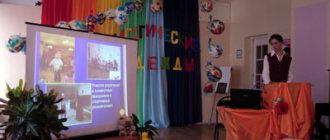Psychological relaxation games for teachers
In 3-5 minutes spent on psychotechnical exercises, a teacher can relieve fatigue, stabilize, and feel self-confident. Like a worker who takes a shower after a hard day in a hot shop, a teacher who performs special psychotechnical exercises at school and after work resorts to the “psychological shower” method, which cleanses his psyche.
Exercise 1. “Inner Ray”
The exercise is performed individually; helps relieve fatigue, gain inner stability…….
In order to perform the exercise, you need to take a comfortable position, sitting or standing, depending on where it will be performed (in the teacher’s room, in class, in transport).
Imagine that inside your head, in the upper part, a light ray appears, which slowly and consistently moves from top to bottom and slowly, gradually illuminates your face, neck, shoulders, hands with a warm, even and relaxing light. As the beam moves, wrinkles are smoothed out, tension in the back of the head disappears, the fold on the forehead is weakened, the eyebrows fall, the eyes “cool”, the clamps in the corners of the lips are loosened, the shoulders drop, the neck and chest are freed. The inner ray, as it were, forms a new appearance of a calm, liberated person, satisfied with himself and his life, profession and students.
Perform the exercise several times - from top to bottom.
Doing the exercise will give you pleasure, even pleasure. End the exercise with the words: “I have become a new person! I became young and strong, calm and stable! I will do everything well!”
Exercise 2. “Press”
The game exercise is performed individually. Neutralizes and suppresses negative emotions of anger, irritation, increased anxiety, aggression. We recommend doing this exercise before working in a “difficult” class, talking with a “difficult” student or his parents, or before any psychologically stressful situation that requires internal self-control and self-confidence. The exercise is best done immediately after you feel psychological tension. If for one reason or another this moment is missed, then the raging emotional “element” can sweep away everything in its path and make it impossible to control itself. As a result, something happens that we see so often: negatively charged energy is “dumped” onto a student or work colleague. Most often, the “grounding” of negative energy, unfortunately, occurs in the teacher’s family, where he weakens internal control after work.
The essence of the exercise is as follows. The teacher imagines inside himself, at chest level, a powerful press that moves from top to bottom, suppressing the negative emotions that arise and the internal tension associated with them. When performing the exercise, it is important to achieve a clear feeling of the physical heaviness of the internal press, suppressing and, as it were, pushing down unwanted negative emotions and the energy that it carries with it.
Exercise 3. “Maria Ivanovna”
The exercise develops internal means of role decentration.
Performed individually, within 10-15 minutes. Imagine your unpleasant conversation, for example, with the head teacher. Let's call her Maria Ivanovna, who allowed herself an uncivil tone in a conversation with you and unfair remarks. The working day is over and on the way home you once again remember the unpleasant conversation, and a feeling of resentment overwhelms you. This is harmful to your psyche: against the background of psychological fatigue after a working day, mental stress develops. You try to forget the insult, but you fail.
Try going the other way. Instead of forcibly erasing Maria Ivanovna from your memory, try, on the contrary, to bring her as close as possible. Try playing the role of Maria Ivanovna on the way home. Imitate her walk, her manner of behavior, play out her thoughts, her family situation, and finally, her attitude towards a conversation with you. After a few minutes of this game, you will feel relief and tension will subside. Your attitude towards the conflict, towards Maria Ivanovna will change, you will see a lot of positive things in her, things that you did not notice before. In fact, you will be involved in Maria Ivanovna’s situation and will be able to understand her. The consequences of such a game will reveal themselves the next day when you come to work. Maria Ivanovna will be surprised to feel that you are friendly and calm, and she herself will probably begin to strive to resolve the conflict.
Exercise 4. “Head”
The profession of a teacher is not only classified as stressful, it is a profession of managerial work. The teacher is forced to continuously influence students during the working day: to restrain them in some way, to suppress their will and activity, to evaluate, to control. Such intensive management of the learning situation causes “management stress” in the teacher and, as a consequence, when overexerted, various physical ailments occur. One of the most common complaints from teachers is headaches and heaviness in the occipital region of the head.
An exercise is suggested to help relieve unpleasant somatic sensations. Stand straight with your shoulders back and your head thrown back. Try to feel in which part of the head the feeling of heaviness is localized. Imagine that you are wearing a bulky headdress that puts pressure on your head in the place where you
you feel heaviness. Mentally remove the headdress with your hand and expressively and emotionally throw it to the floor. Shake your head, straighten the hair on your head with your hand, and then throw your hands down, as if getting rid of a headache.
Exercise 5. “Hands”
It's your last lesson. The class is busy solving a problem. The class is quiet and you can take a few minutes to yourself. Sit on a chair with your legs slightly extended and your arms hanging down. Try to imagine that the energy of fatigue “flows” from the hands to the ground - it flows from the head to the shoulders, flows over the forearms, reaches the elbows, rushes to the hands and seeps down through the fingertips into the ground. You clearly physically feel the warm weight sliding over your hands. Sit like this for one to two minutes, and then lightly shake your hands, finally getting rid of your fatigue. Stand up easily, springily, smile, walk around the class. Enjoy the interesting questions that children ask, try to meet them halfway openly and with full readiness, answering thoroughly and in detail.
Exercise relieves fatigue, helps establish mental equilibrium, balance.
Exercise 6. “I am a child”
Many experienced teachers play the game “I am a child.” Here, for example, is how he describes his state: “My method: I evoke in myself a state of childhood, i.e. I evoke in myself that feeling of childish lightness that is characteristic of a child: I throw off “everything adult”, and mainly, that external adultness that is inherent in my administrative role. Next comes the selection of forms of addressing children, which include the choice of intonation, method of explanation, demeanor, and most importantly, thinking through the first words, so to speak, the formula of address.”
Remember what game you loved most as a child. Do you remember? Now go to your child or grandchild and invite him to play this game. During the game, you must play the role of a child, be on an equal footing with your partner. This gives him the opportunity to feel like a leader and discuss the rules of the game with you. And you will feel the freshness, originality, originality of children's thinking, the richness of the child's inner world. You will probably become closer to him.





